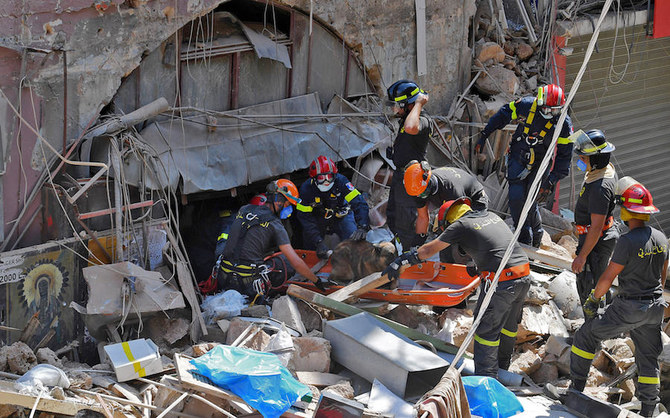BEIRUT: Beirut residents began trying to rebuild their shattered lives on Friday after the biggest blast in the Lebanese capital’s history tore into the city, killing at least 154 and leaving the heavily indebted nation with another huge reconstruction bill.
The search for those missing since Tuesday’s blast intensified overnight, as rescuers sifted rubble in a frantic race to find anyone still alive after the explosion smashed a swathe of the city and sent shockwaves around the region.
Security forces fired teargas at a furious crowd late on Thursday, as anger boiled over at the government and a political elite, who have presided over a nation that was facing economic collapse even before the deadly port blast injured 5,000 people.
The small crowd, some hurling stones, marked a return to the kind of protests that had become a feature of life in Beirut, as Lebanese watched their savings evaporate and currency disintegrate, while government decision-making floundered.
Opinion
This section contains relevant reference points, placed in (Opinion field)
“There is no way we can rebuild this house. Where is the state?” Tony Abdou, an unemployed 60-year-old, sitting in the family home in Gemmayze, a district that lies a few hundred meters from the port warehouses where highly explosive material was stored for years, a ticking time bomb next to a densely populated area.
As Abdou spoke, a domestic water boiler fell through the ceiling of his cracked home, while volunteers from the neighborhood turned out on the street to sweep up debris.
“Do we actually have a government here?” said taxi driver Nassim Abiaad, 66, whose cab was crushed by falling building wreckage just as he was about to get into the vehicle.
“There is no way to make money anymore,” he said.
The government has promised a full investigation and put several port employees under house arrest. State news agency NNA said 16 people were taken into custody. But for many Lebanese, the explosion was symptomatic of the years of neglect by the authorities while state corruption thrived.
Shockwaves
Officials have said the blast, whose seismic impact was recorded hundreds of miles (kilometers) away, might have caused losses amounting to $15 billion — a bill the country cannot pay when it has already defaulted on its mountain of national debt, exceeding 150% of economic output, and talks about a lifeline from the International Monetary Fund have stalled.
Hospitals, many heavily damaged as shockwaves ripped out windows and pulled down ceilings, have been overwhelmed by the number of casualties. Many were struggling to find enough foreign exchange to buy supplies before the explosion.
In the port area, rescue teams set up arc lights to work through the night in a dash to find those still missing, as families waited tensely, slowly losing hope of ever seeing loved ones again. Some victims were hurled into the sea because of the explosive force.
The weeping mother of one of the missing called a prime time TV program on Thursday night to plead with the authorities to find her son, Joe. He was found — dead — hours later.
Lebanese Red Cross Secretary General George Kettaneh told local radio VDL that three more bodies had been found in the search, while the health minister said on Friday the death toll had climbed to 154. Dozens are still unaccounted for.
Charbel Abreeni, who trained port employees, showed Reuters pictures on his phone of killed colleagues. He was sitting in a church where the head from the statue of the Virgin Mary had been blown off.
“I know 30 port employees who died, two of them are my close friends and a third is missing,” said the 62-year-old, whose home was wrecked in the blast. His shin was bandaged.
“I have nowhere to go except my wife’s family,” he said. “How can you survive here, the economy is zero?“
Offers of immediate medical and food aid have poured in from Arab states, Western nations and beyond. But none, so far, address the bigger challenges facing a bankrupt nation.
French President Emmanuel Macron came to the city on Thursday with a cargo from France. He promised to explain some “home truths” to the government, telling them they needed to root out corruption and deliver economic reforms.
He was greeted on the street by many Lebanese who asked for help in ensuring “regime” change, so a new set of politicians could rebuild Beirut and set the nation on a new course.
Beirut still bore scars from heavy shelling in the 1975-1990 civil war before the blast. After the explosion, chunks of the city once again look like a war zone.

















